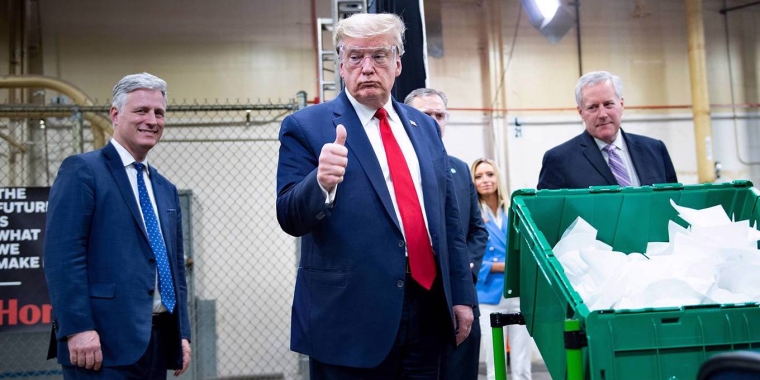
A recent commentary in the Wall Street Journal exposes the dark hole into which conservative economic thinking has sunk since the pinnacle of its influence in the 1980s. Economists Casey B. Mulligan and Tomas J. Philipson of the University of Chicago, both of whom served in Donald Trump’s administration, have used the COVID-19 pandemic to make the case for abandoning what they see as the conventional wisdom among economists: “that the purpose of government policy is to correct market failures.”
Turning this dictum on its head, they argue that “government policy fails much more frequently” than markets do, and that markets correct government policy by rescuing citizens from the terrible decisions that governments routinely make. It thus follows that the COVID-19 pandemic was the result of government policy. Either the virus escaped from a Wuhan laboratory that had received US government funding, or it spread because Chinese authorities failed to inform the world in time, and because the US government flipflopped on its messaging about face masks and lockdowns.
Mulligan and Philipson then argue that it was private enterprise that “quickly controlled” the pandemic (all thanks to Trump, of course), even though the virus is still running rampant. “Getting the government out of the way was essential,” they write. That was “the goal of President Trump’s Operation Warp Speed.”
Operation Warp Speed was indeed a success, but it was also a classic government intervention in the free market. Costing more than $10 billion, it was designed to correct a market failure – exactly the opposite of what Mulligan and Philipson claim. The market failure was the lack of incentives for private companies to invent and distribute a vaccine, presumably because the costs and risks could not justify the return if they succeeded. The government stepped in by throwing money at the companies, guaranteeing a market, and supplying technical advice and coordination.
This intervention was no different in spirit from mask requirements and lockdowns, which also solve a market failure. Without government regulation, many individuals and businesses would externalize the risk of passing infections on to others by failing to take adequate precautions.
A market failure occurs whenever a private agent’s actions cause social costs that exceed private costs. Such instances are ubiquitous. When people are rational and amoral (as economists normally assume), they have every incentive to dump waste in rivers, drive faster than is safe for pedestrians, cyclists, and other drivers, and spread contagious diseases to others if they feel well enough to go out. The only thing that prevents market failures is the law, which is created and enforced by government. The idea that “government failures” are more common than or worse than market failures is incoherent. Without a government, there would be nothing but market failures.
True, governments make mistakes. Maybe China did regulate the Wuhan lab insufficiently, or the US government unwisely sent funds to a foreign lab without ascertaining first that it operated safely. But what is the alternative? There are researchers around the world studying and modifying dangerous viruses in order to develop vaccines and therapies against them. When done safely, this work is valuable. In a free market for such research and development, the government would impose no safety regulations at all on private labs. Researchers (and anyone else) would be allowed to operate however they liked.
Could this really be what Mulligan and Philipson advocate? Clearly, the only solution to government failure is better government policy, not no government policy. The elimination of government involvement in vaccine research – both to promote and regulate it – would be disastrous.
Mulligan and Philipson might also have argued that the US Food and Drug Administration or the Centers for Disease Control and Prevention should be abolished, or advocated scrapping the enormous range of federal and state laws that public-health authorities used to shut down businesses and impose mask mandates. These agencies and statutes allow the government to address problems of public health, including contagious diseases – a market failure par excellence.
FDA emergency authorization has been important for overcoming the doubts of the vaccine-hesitant, while CDC guidelines – as frustrating as they may be – have helped local public-health authorities understand their options. These government interventions have been a godsend for businesses, which have relied on them in determining how to treat employees and customers. (Contrary to Mulligan and Philipson’s claim, businesses did not figure these things out on their own.)
In a remarkable statement, Mulligan and Philipson write that, “Politicians craft tax policy to favor certain interest groups, but the private sector corrects such failures by substituting to less-taxed activities.” This, apparently, is another way that “markets” save us from “government failure.”
But, in fact, when economists use the word “tax,” they are referring not just to levies on income, but, more broadly, to sanctions imposed on polluters, fraudsters, criminals, reckless drivers, financial institutions that risk their customers’ money, and anyone else who causes harm to others. When private actors respond by substituting to less-taxed but functionally similar activities, that is called “regulatory arbitrage,” and it is an enormous problem whenever the taxed activity, like pollution, causes harm (as is usually the case).
The “government-bad-market-good” argument had a good run back in the 1980s. But it was dealt a body blow by the 2008 financial crisis, when “good” government, led by the US Federal Reserve, rescued financial markets from self-destruction caused by the deregulation promoted by free-market advocates. Another blow has come with the pandemic, which itself most likely emerged in a free (wet) market in Wuhan, where people could buy and sell live animals without paying adequate attention to the risk of zoonotic infection.
Government programs and interventions such as mask mandates have helped mitigate the worst effects of the pandemic. Trump’s major achievement was using government to create the conditions for rapid vaccine development; his major failure was not going further and undermining efforts by state and local governments to control the pandemic.
Mulligan and Philipson are accomplished economists. It is mysterious that they take the worst market failure in decades as an opportunity for arguing that markets solve the problems created by government. Redefining a massive government intervention as “getting out of the way of business” seems at best an effort to rationalize their former boss’s political opportunism by treating his multiple failures to use government to address the pandemic as continuous with his one real achievement. This kind of argument hardly rescues free-market economics from its latest moral and intellectual failures, and will only sow public confusion as governments gear up to confront another wave of infections.
Eric Posner, a professor at the University of Chicago, is the author, most recently, of The Demagogue’s Playbook: The Battle for American Democracy from the Founders to Trump (All Points Books, 2020). This content is © Project Syndicate, 2021, and is here with permission.
7 Comments
Its laughable....'the market' and the 'government are the same people, the only difference is the level of influence(power)
The market is the people and politics is the will of the majority ....Chicago boys are concerned they are losing the influence of their dollars.....never mind, you can still buy the odd Congressman...BAU.
Same as NZ. Our draconian libel laws preclude any kind of reckoning with what went on in the 80s.
Great write up and bang on the money.
spot on. great piece.
"True, governments make mistakes. Maybe China did regulate the Wuhan lab insufficiently, or the US government unwisely sent funds to a foreign lab without ascertaining first that it operated safely. But what is the alternative?""
Obviously the alternative would be to ban gain of function research as Obama did because it is just to damn dangerous for humanity. We got lucky with Covid. What is the next virus going to be like!
COVID has shown that an ongoing global pandemic with no end in sight does worse damage to economies and human freedoms than bombing raids or terrorism or totalitarianism (though this virus is shifting societies to a more totalitarian state) due to our ineffective weapons. If it was deliberate then it is a very clever and effective warfare tactic.
"Another blow has come with the pandemic, which itself most likely emerged in a free (wet) market in Wuhan"
Still circulating the "it came from a wet market" theory? It was winter - there were NO bats for sale in the markets.
Oh look, there just so happens to be a level 4 virology lab right in the city - Tasked with investigating highly infectious diseases - and one of them being the coronavirus from bats. They claimed there were no bats in the lab, but an older Chinese TV news report on the lab showed bats in cages, supposedly on premises.
The Chinese blocked access to the lab and delayed investigations by WHO. And some reports state that they deleted databases from related research leading up to when the pandemic started. AND the US State Dept reports that some staff were sick in December 2019 with Covid-like symptoms.
I guess since the Chinese are blocking any meaningful investigations, the only theory left to peddle is the wet market one... where no bats were available to sell.

We welcome your comments below. If you are not already registered, please register to comment
Remember we welcome robust, respectful and insightful debate. We don't welcome abusive or defamatory comments and will de-register those repeatedly making such comments. Our current comment policy is here.